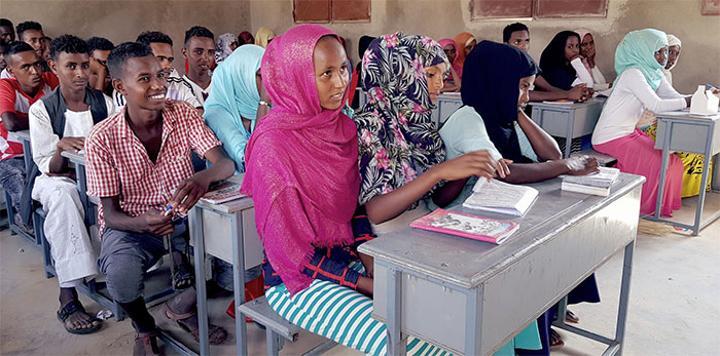Africa-Press – Eritrea. In the preceding month, the Ministry of Education convened its annual activity assessment meeting, a prelude to the commencement of the upcoming academic year. This gathering involved representatives from all six administrative regions of the nation, Warsay Yikealo Secondary School Sawa, Eritrean community schools in Sudan and Saudi Arabia, as well as Vocational Training Centers. These delegates presented comprehensive reports addressing various facets of the education sector, ranging from opportunities to challenges. The participants evaluated the prior year’s activities and proffered constructive proposals for the impending academic year.
Gash Barka, the largest administrative region in Eritrea, shares borders with Ethiopia and Sudan. Comprising 16 subzones and encompassing 977 villages, the region is home to approximately one million residents. Historically, prior to independence, Gash Barka languished as one of Eritrea’s most marginalized regions, lacking access to essential social services. Educational facilities were scarce and predominantly confined to urban centers established during Italian colonization, such as Akordet, Barentu, and Tessenai. Post-independence, the Eritrean government embarked on a determined initiative to extend education to remote rural areas where educational opportunities had been virtually nonexistent. Currently, the region hosts a total of 619 schools, catering to students from kindergarten through high school.
Expanding the educational network represents the primary step in ensuring equitable educational access and fostering holistic development. The National Charter of Eritrea (1994) enshrines the commitment to “widely expand education so that our people can be free from ignorance, acquire knowledge and skills through various means, and enhance their productive capacity to build their country. Education is a fundamental right to which every Eritrean is entitled.”
While progress has been made, the government acknowledges the need for further expansion. In comparison to the 2021/2022 academic year, there was a 7.5% increase in the number of schools and a 6% rise in student enrollment in the 2022/23 academic year. Nevertheless, achieving gender parity remains a critical challenge, with female students comprising 45%, 42%, and 38% of elementary, junior, and high school populations, respectively. Addressing this gender gap aligns with national and global objectives, such as SDG Goal 4, which strives for “inclusive and equitable quality education,” and SDG 5, dedicated to “achieving gender equality and empowering all women and girls.”
Gash Barka, often referred to as the “breadbasket” of Eritrea, is a melting pot of eight out of the nine ethnic groups in the nation. The National Education Policy of Eritrea highlights the importance of mother tongue instruction at the elementary level. In Gash Barka, there are 82 Arabic, 5 Bidawyeet, 49 Kunama, 29 Nara, 2 Saho, 122 Tigre, and 201 Tigrigna elementary schools teaching with mother tongue. The remaining 129 middle and secondary schools employ English as the medium of instruction. However, there exists a shortage of qualified teachers proficient in mother tongue instruction within these communities. Consequently, recruiting and training new teachers’ proficient in mother tongue education is imperative to accommodate the growing student enrollment in newly established schools.
The government’s commitment to eradicating illiteracy finds its most profound manifestation in Gash Barka. In addition to conventional classrooms, 415 literacy centers were established throughout the region. These innovative interventions have substantially reduced illiteracy rates, with more than 17,000 adults benefiting from the program in the past year alone. Over the three decades since independence, Eritrea has made remarkable strides in adult literacy, increasing from 46% in 1990 to approximately 77% by 2018.
Universal basic education was envisioned as one of Eritrea’s monumental development successes, aimed at expanding educational opportunities for its burgeoning youth population. Education is recognized as a transformative force, driving economic growth, fostering personal and societal development, and combating poverty. It is a tool to empower individuals, communities, and the nation as a whole.
The schools in Gash Barka, particularly those in remote areas, face challenges associated with limited physical and human resources. With over four thousand teachers spread across this vast region, ensuring that schools are staffed with well-trained educators remains a formidable task. The regional administration and local communities have stepped up by providing additional resources, enhancing the teaching and learning process. The Eritrean Defense Forces also play a pivotal role in remote areas like Sel’a aiding in transportation, school construction, and teacher housing, while also conducting awareness campaigns to increase school enrollment.
Gash Barka, characterized by its low population density and remote locations, poses unique challenges in ensuring equal access to quality education. To bridge this gap, the government and local communities are collaborating on initiatives and alternative forms of education to reach those who have been historically underserved.
Source: Eritrea Ministry Of Information
For More News And Analysis About Eritrea Follow Africa-Press







